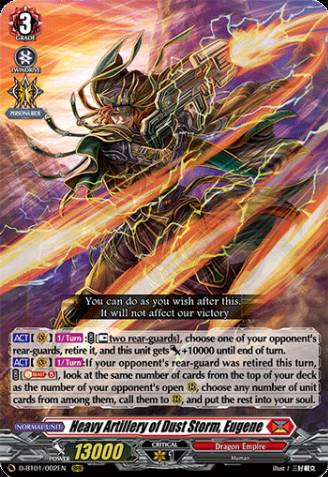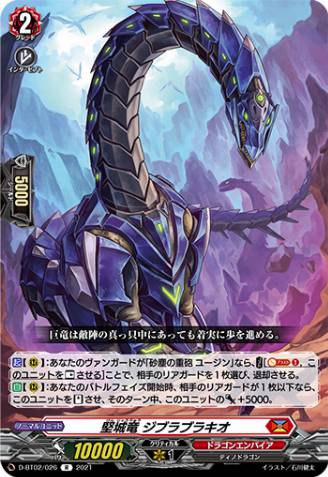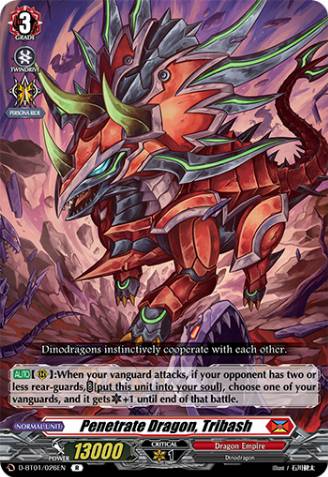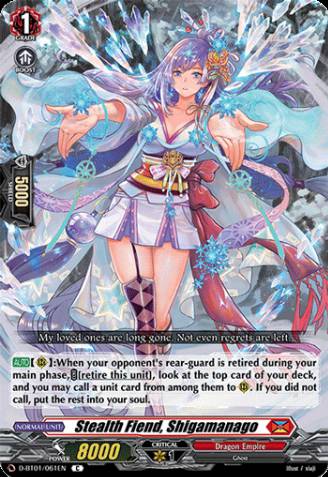Table of Contents
- Introduction: Eugene who?
- Playstyle: What do I do with my gunslinging, field-nuking vanguard?
- Why did I choose Eugene: A short flashback
- Eugene Mechanics: What can I expect to see from a non-meta deck?
- The Cool Things: Why this deck is numero uno number one
- The Uncool Things; Why this deck is NOT actually numero uno number one in the meta
- Conclusion: Should I REALLY play this deck?
Introduction: Eugene who?
If there are any builds that best fit the good ol’ methodical retire of Kagero during the early days, no other deck does this as well as Eugene. The playstyle of Eugene is simple: build up a soul and nuke your opponent’s fields using your gunslingers, dinosaurs, and ninja dragons. Aside from heavily damaging your opponent’s field, you get the benefit of potentially calling a full field from Eugene’s second skill, which superior calls up to five rearguards from the top of your deck by soul blasting five. That’s it. No strings attached. No discards, heavy counterblasts, or even retire. All you have to do is play the deck and suddenly you go from Kagero to good ol’ Gold Paladin and their cheap top deck calling (which unfortunately will inevitably lead to you calling triggers to your field). It’s not as aggressive as Bastion or Bruce, nor does it have the absurd rearguard columns of Nirvana. However, what makes Eugene stand out from the bunch is his ability to wipe your opponent’s field easily, quite permanently when compared to Seraph Snow. It’s fun and simple as it can get and is just overall great if you miss the methodical retire of Dragon Empire clans, a refreshing change from the one-hit full-field nuke from the power crept premium format.
Playstyle: What do I do with my gunslinging, field-nuking vanguard?
As of DBT-02, Eugene is more of a vanguard-focused clan. Your rearguards seldom gain absurd numbers from retiring the opponent’s field as opposed to Kagero and Narukami, but your vanguard alone, on a persona ride, can reach up to 43k easily and can hit for 23k each turn if you get his skill off. In addition, Eugene’s cost for retire, while doesn’t eat a counterblast, forces you to rest two rearguards to retire one of your opponent’s cards, which can severely weaken the already mediocre rearguard columns the deck has because of either sacrificing a booster or an attack. Fortunately, some cards such are Shigamanago and Tribash, who are deck staples, are able to mitigate this issue by either calling another rearguard on top of them or giving your high-powered vanguard a critical, which forces your opponent to drop a perfect guard if they want to block it without shredding their entire hand in the process. You also have Gibrabrachio who is essentially Eugene’s bread and butter; you can pay a soul blast and rest the unit to retire an opponent’s rearguard. In the battle phase, if your opponent has one or fewer rearguards, it restands with an additional 5k, allowing it to serve as a reliable 23k beater when boosted.
In essence, Eugene is focused on resource manipulation; the playstyle of Eugene is to heavily control your opponent’s resources by easily eliminating their rearguards and calling from the top deck to avoid having to use their hand to build a field. Thus, the deck benefits from having drawn-out games as your opponent are slowly unable to replenish the cards they lose from having their field nuked whilst being able to call your own should you really need it. Your opponents might be able to mitigate this by being smart in calling their key units, but you can capitalize on this by being able to guard less, thus allowing you to maintain a healthy hand from their nerfed attacks. This makes Eugene a defensive-oriented deck; it does not have multiple attacks and powerful rearguard columns, but it is easily able to control the tempo of the fight by threatening to retire your opponent’s key units if they dare play recklessly against you. Because it benefits from drawn-out games, the best trigger line-up for Eugene is this 8 criticals, 3 draws, 1 OT, and 4 heals. This allows Eugene to hit hard using criticals and if combined with Tribash, can force your opponent to guard as early as three damage if they don't want to risk losing early on. If you want a non-meta and cheap deck whose playstyle is focused on deliberate decisions and resource control, then Eugene might be a good fit for you.

Card Spotlight: Heavy Artillery of Dust Storm, Eugene - The face of the deck himself, Eugene is a plussing and minusing machine. He either retires your opponents or calls rearguards to the field. This gimmick of his turns the deck's playstyle into a more resource-control-oriented one, as the goal of this deck is to deprive your opponent of resources while consistently replenishing your own.
Why did I choose Eugene: A short flashback
I mainly decided to play Overdress because of how cheap the trial decks were. As someone who began playing in 2014, I was a victim of the bad trial deck problem that plagued many players; back then, you would need four copies of a trial deck just so you can get four copies of the main unit, which in my case was Daikaiser. Trial decks also did not have sentinels included back then, so it was quite difficult to play a decent deck from just having one copy. It was mitigated by the G era when trial decks had two copies of the boss cards and two sentinels. Thus, when I saw the content of Overdress decks and how affordable it was, I decided to give the format a shot and fell in love with how easy it was to pick up the format.
However, because Overdress was in its infancy, I struggled to find decks that resembled my favorite clan, Dimension Police. Bruce was fun to play, but I felt like I was losing my sanity bit by bit as I played the deck and have all my triggers go to the soul. Seraph Snow was reminiscent of Dimension Police, but it lacked the oomph-filled vanguard attack that I love in Dimension Police. I even tried becoming a meta gamer and using Bastion, but I was deterred from playing it because of how expensive the support cards were and how common it was in the meta. Eventually, I decided to try Eugene after seeing the efforts of Eugene mains in advocating the legitimacy of their clan (you da real MVPs out there, fellow Eugene mains). After seeing how well the deck can retire and how laid back it felt (because really, Eugene isn’t the best choice to play hyper-competitively or consistency), I fell in love with it. The rearguard sniping the deck had felt like I was playing Kagero all over again, and I got the benefit of having a multi-critical attack thanks to Tribash. Eventually, I decided to commit some resources into building it and I finally have a deck that I can comfortably play while not having to sell my kidney to build the actual deck. To this day, I play the deck even if it isn’t meta, just because of how fun it is to play.
Eugene Mechanics: What can I expect to see from a non-meta deck?
1.) Rearguard sniping – Eugene is perhaps the best deck when it comes to retiring rearguards. Nearly all your units can retire your opponent’s rearguards without using up a counterblast and aren’t bound to restrictions when doing so. Because Eugene is able to replenish his own soul, you essentially have costless retires. Want to snipe that pesky vanguard user? Eugene will happily snipe it for you. Pesky front row Valiente that you can’t hit with your puny rearguards? Uncle Gibrabrachio will take care of it for you. Because Eugene does retiring really well, you can expect to see your opponent suffer from having open rearguard circles, all while having a full field of your own thanks to Eugene’s superior calling.
2.) Superior calling – Eugene’s second ability allows you to call a rearguard for each of your opponent’s open rearguard circles, which is technically five since your opponent will be either too scared to call rearguards or have their field wiped the moment, they dare call one in the first place. If you get REALLY lucky, you are looking at filling your entire field with a five-soul blast cost, which essentially sets you for the rest of the game unless you’re playing mirror match-ups or clans that can nuke your field too (*cough* Baromagnes). Unfortunately, what really happens when using this skill is that you top deck a trigger or two, which means that you won’t be able to get a full field call. The good thing about this though is that you have more soul to work with while having a free +3 on your side.
3.) Hipster Privileges – The fact that you chose Eugene means that you are a sigma cardfighter and thus exist outside of the cardfighting hierarchy. You are not a slave to meta and have your own grindset, which means that you are able to inevitably counterplay some decks because of how surprised they are to see that someone can topple down their magnificently planned and placed powerful rearguards. The lion does not concern itself with the opinions of the sheep, so you decide to play this non-meta deck anyway even if people are telling you to pick up Bastion* or something. Because this is a non-meta deck, you can expect very cheap prices in building it, all while quite having a decent and enjoyable playstyle. Quite simply, you get to play an enjoyable deck without splurging too much on resources
*No offense meant to all meta users; I just say this out of the spirit of joking. Love y’all.

Card Spotlight: Gibrabrachio - Gibrabrachio was one of the main cards that brought more options in using a Eugene deck. He can either be rested to retire one of your opponent's rearguards for a soulblast one or Eugene can rest him to retire your opponent's rearguards. Either way, he restands at the end of the turn with a +5k, making him the perfect partner to Eugene for essentially costless retires.
That being said, here are the cool and uncool things about being a Eugene main
The Cool Things: Why this deck is numero uno number one
- Low-Cost Field Control: Eugene’s cost for retiring is just so low that it’s really easy to spam it. You have Gibrabrachio who just has to rest itself and soul blast one to retire one of your opponent’s rearguards, and Kizanreiji who retires the unit in the same column as him for a cost of a counterblast and a soul blast. Because of how cheap it is to activate your skills, your opponent is forced to play carefully or risk having their key units nuked to kingdom come. They either don’t call much RGs (which makes guarding much easier, thus a plus for you) or call RGs and have them retired (which is a minus to them). In essence, the threat of Eugene’s retires allows you to dictate the tempo of the fight, as your opponent knows what you can do to them if they dare make the mistake of calling a full field.
- Easy Plusses – Thanks to the deck’s ability to superior call units, it is quite easy to build a field with minimal commitment. While soul charging a trigger or two or even calling a sentinel is inevitable, you are almost always ahead of your opponent when it comes to plussing; they lose more and more rearguards while you are able to stock up on cards. Even if you find your field being nuked by field control decks or Lenard, you have backup options to ensure that you don’t lose your ability to pressure your opponent. Thus, this playstyle might appeal to players who want to have other options in case they face opponents that can mess with their field too.
- Workable Early Game, Good Midgame, Decent Endgame – Eugene is able to shine in mid to late game, just when your opponents start to set up for their game-securing turns. Is Bruce about to Final Rush you? Convince him that maybe it isn’t the time yet by flexing your Gibrabrachio-Tribash-Eugene combo. Is Magnolia getting too rearguard-happy and decides to start shredding your hand? Remind them who’s in charge and destroy their entire field. Eugene is good in midgame in the sense that he stops your opponent from doing good in that phase in the first place. Ultimately, the goal of Eugene is to win by having a huge divide and resources, and boy does he do it well.
- Very Affordable – Eugene support is just really, really cheap, and I mean it. A single copy of Vairina Arcs, a support card for Nirvana and an RR, costs more than a copy of Eugene himself, who is an RRR. This makes it highly accessible for players who want to try the deck. Personally, I spent around 25 USD building this deck (before the trigger prices went through the roof) and I have enjoyed it since then. It’s easy to build and pick up, which to me is one of the biggest charms of the deck.

Card Spotlight: Penetrate Dragon, Tribash - Tribash is the deck's way of replenishing soul and making your vanguard more threatening. Provided your opponent has two or fewer rearguards, it gets shoved into the soul to give Eugene an additional critical. Because it isn't restricted to the front row, if you already have two front-row units when deciding to use Eugene's call skill, you can place it back row, rest it for Eugene's skill, and then put it into the soul once Eugene attacks. Thus, it's hard for this card to be useless because of the many options you can use to take full advantage of its cost.
However, there is a good reason why despite having good field control, Eugene is still unable to climb to the top. While a strong deck in his own right, he has some shortcomings, shortcomings that prove to be too important to have as a flaw. Thus, it might take some time (fingers crossed for DBT-03) before Eugene can live to his full potential – if Bushiroad is merciful enough that is.
The Uncool Things; Why this deck is NOT actually numero uno number one in the meta
- Horrible consistency – What’s that? Did you want to use his soul blast to replenish your rearguards AND get a good field? Unfortunately, that won’t be the case most of the time because of the deck’s random nature (you either get rearguards or a good field. You have to pick only one). For the main gimmick, it’s too unreliable, which makes it undesirable for players in the competitive play who would prefer a more consistent ability, even at the cost of losing some payoffs. One of the main criticisms of the deck is that it is too inconsistent and the possible drawbacks simply outweighing the possible payoffs. Even if you use the superior calling ability, you run the risk of decking out and with Eugene’s lack of powerful rearguards, this will often be the case if your opponent is able to weather down your attacks and retires. Thus, the second skill is quite useless because of how it can backfire on you if you are not lucky enough. You either risk too much by using the superior call or not use it at all, rendering it quite useless.
- Too many bad match-ups: Eugene unfortunately quickly falls flat against many decks that you can expect to see in a tournament setting. Eugene struggles against Bastion once they go double Fosado, which locks you out from using your Gibrabrachio’s powerful skill, unless you decide to risk and potentially waste an attack trying to kill the unit. A smart Trickstar player can also circumvent or even outright shut down Eugene’s playstyle by doing the famous “Triple Trickstar Combo”. Because Eugene’s rearguards are reliant on the enemy having two or fewer rearguards, they basically become vanilla once the Trickstar players sets-up their field. Do not even get me started on Baromagnes, who basically bounces their rearguards to the soul, leaving you with nothing to retire. On the flip side, you are able to proc your rearguard skills, in which case the game becomes a grind to the finish. Thus, this quality alone can deter players from playing the deck in a competitive setting.
- Lack of rearguard pressure – If you’re the type to prefer to swing with a high-powered rearguard, then this deck is not for you. Eugene’s rearguards hit 23k at most, 33k on persona ride, and literally does nothing else outside of retiring. Some players may find this undesirable because the vanguard itself, to be frank, does nothing more outside of a single retire and a being a 23k beat stick. You don’t even have restands for the deck, so you’re basically locked to up to three attacks, which unfortunately is not really good especially if you’re not hitting high magic numbers like Nirvana. Good luck trying to end games with your puny rearguards.
- Lack of Good Support – Seriously. The deck got shafted in favor of the two encounter clans in Overdress and it’s still suffering from the same issues it has despite the decent support it received. The deck suffers from inconsistency, and there are currently no rearguards that can help mitigate or even fix this issue Eugene decks have. The only good support they got was Gibrabrachio and Iduriss, but even they are not enough to push Eugene to a more threatening role. Until Eugene is given support that either gives benefits to the player for each empty rearguard circle the opponent has or ways to force cards out from his opponent, then he will be stuck as a non-meta deck.

Card Spotlight: Stealth Fiend, Shigamanago - Shigamanago is one of the best rearguards to rest when using Eugene, as she basically allows you to refresh that rearguard circle by potentially calling another unit on top of her after she is retired. Because of her skill, it is possible to reorganize your field depending on what cards you need at the moment or filter Eugene's top deck before he uses his skill to ensure that you are getting the rearguards that you need.
Conclusion: Should I REALLY play this deck?
Ultimately, Eugene is a fun and simple deck to play that does not take much financial commitment to actually build. Despite being non-meta, he is able to hold himself firmly against more meta and aggressive decks, in the hands of a smart and cunning player. If not playing competitively, this deck in my opinion is one of the best decks to let newer players use to give them this sense of power. Whether you like to mess with your opponent’s field or just want a budget deck you can play, Eugene has something for everyone.
That’s all, thank you for reading my article and I wish you the happiest and thrilling of cardfights!